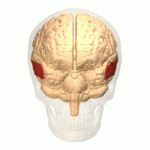Middle temporal gyrus
The middle temporal gyrus (MTG) is a region of the brain located in the temporal lobe. It is situated between the superior temporal gyrus and the inferior temporal gyrus. The MTG plays a crucial role in various cognitive functions, including language processing, semantic memory, and visual perception.
Anatomy[edit | edit source]
The middle temporal gyrus is part of the temporal lobe, which is one of the four major lobes of the cerebral cortex. The MTG is bounded superiorly by the superior temporal sulcus and inferiorly by the inferior temporal sulcus. It extends from the temporal pole anteriorly to the occipital lobe posteriorly.
Function[edit | edit source]
The middle temporal gyrus is involved in several important cognitive functions:
- Language Processing: The MTG is implicated in the processing of semantic memory and the comprehension of language. It works in conjunction with other regions such as the Wernicke's area and the Broca's area to facilitate language understanding and production.
- Visual Perception: The MTG contributes to the processing of complex visual stimuli, including the recognition of objects and faces. It is part of the ventral stream of visual processing, which is responsible for object recognition.
- Memory: The MTG is involved in the retrieval of semantic memory, which is the memory of meanings, understandings, and other concept-based knowledge unrelated to specific experiences.
Clinical Significance[edit | edit source]
Damage to the middle temporal gyrus can result in various neurological and cognitive deficits. Lesions in this area are often associated with aphasia, particularly Wernicke's aphasia, which is characterized by impaired language comprehension and fluent but nonsensical speech. Additionally, damage to the MTG can affect semantic memory and visual perception.
Research[edit | edit source]
Ongoing research is exploring the specific roles of the middle temporal gyrus in different cognitive processes. Functional imaging studies, such as fMRI and PET scans, are frequently used to investigate the activity of the MTG during various tasks related to language, memory, and visual processing.
See Also[edit | edit source]
- Temporal lobe
- Superior temporal gyrus
- Inferior temporal gyrus
- Wernicke's area
- Broca's area
- Semantic memory
- Ventral stream
References[edit | edit source]
External Links[edit | edit source]
Search WikiMD
Ad.Tired of being Overweight? Try W8MD's physician weight loss program.
Semaglutide (Ozempic / Wegovy and Tirzepatide (Mounjaro / Zepbound) available.
Advertise on WikiMD
|
WikiMD's Wellness Encyclopedia |
| Let Food Be Thy Medicine Medicine Thy Food - Hippocrates |
Translate this page: - East Asian
中文,
日本,
한국어,
South Asian
हिन्दी,
தமிழ்,
తెలుగు,
Urdu,
ಕನ್ನಡ,
Southeast Asian
Indonesian,
Vietnamese,
Thai,
မြန်မာဘာသာ,
বাংলা
European
español,
Deutsch,
français,
Greek,
português do Brasil,
polski,
română,
русский,
Nederlands,
norsk,
svenska,
suomi,
Italian
Middle Eastern & African
عربى,
Turkish,
Persian,
Hebrew,
Afrikaans,
isiZulu,
Kiswahili,
Other
Bulgarian,
Hungarian,
Czech,
Swedish,
മലയാളം,
मराठी,
ਪੰਜਾਬੀ,
ગુજરાતી,
Portuguese,
Ukrainian
Medical Disclaimer: WikiMD is not a substitute for professional medical advice. The information on WikiMD is provided as an information resource only, may be incorrect, outdated or misleading, and is not to be used or relied on for any diagnostic or treatment purposes. Please consult your health care provider before making any healthcare decisions or for guidance about a specific medical condition. WikiMD expressly disclaims responsibility, and shall have no liability, for any damages, loss, injury, or liability whatsoever suffered as a result of your reliance on the information contained in this site. By visiting this site you agree to the foregoing terms and conditions, which may from time to time be changed or supplemented by WikiMD. If you do not agree to the foregoing terms and conditions, you should not enter or use this site. See full disclaimer.
Credits:Most images are courtesy of Wikimedia commons, and templates, categories Wikipedia, licensed under CC BY SA or similar.
Contributors: Prab R. Tumpati, MD




